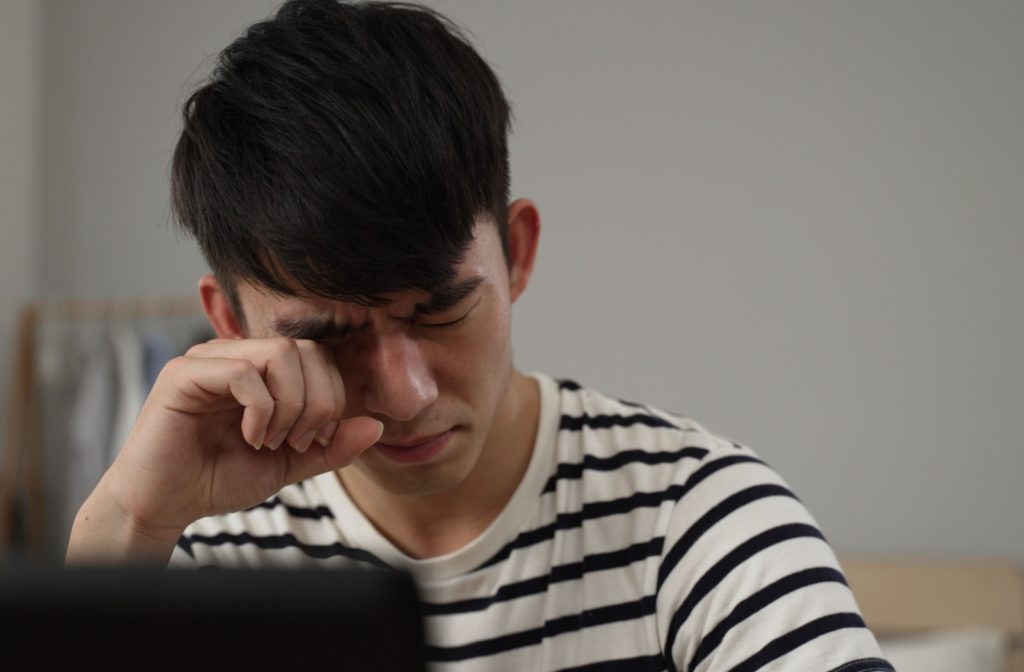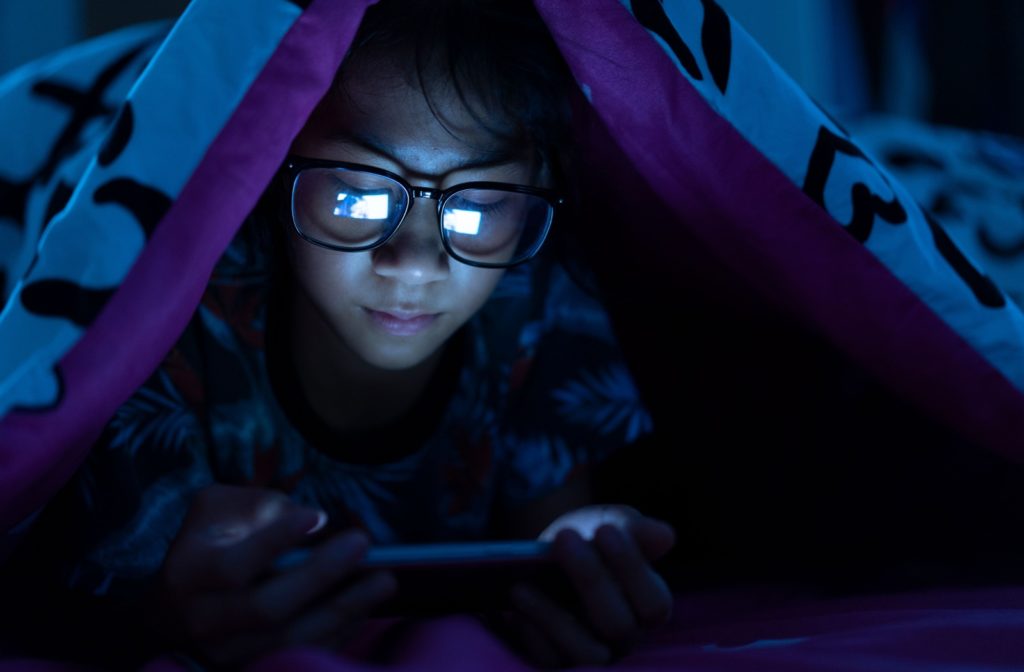As technology continues to dominate our daily lives, we often find ourselves staring at screens for extended periods. Whether for work or entertainment, escaping the blue light emitted by computers, smartphones, and televisions is nearly impossible. Unfortunately, this exposure can lead to dry eye syndrome, a condition affecting millions worldwide.
In recent years, blue light glasses have gained popularity as a means of protecting our eyes from the effects of prolonged screen exposure. But do these glasses help with dry eyes? Blue light glasses can improve visual function in patients with tear instability, a common issue in dry eye syndrome. However, there isn’t enough evidence to recommend them specifically for treating the condition.
If you’re experiencing dry eye syndrome, it’s best to book an eye exam with your doctor to develop a personalized treatment plan.
What is Blue Light?
Blue light is a type of high-energy visible light (HEV) characterized by shorter wavelengths and higher frequencies compared to other colors in the light spectrum. While blue light is naturally present in sunlight, it is also emitted by electronic devices such as LCD and LED screens, fluorescent bulbs, and digital televisions.
Research has indicated that prolonged exposure to blue light can disrupt our circadian rhythm, suppress melatonin production, and lead to eye strain, headaches, and other health issues.
What are Blue Light Glasses?
Blue light glasses, also known as blue light blocking glasses, are designed to filter out high-energy blue light emitted by electronic devices. Some of these glasses have a yellowish tint, which is believed to help reduce eye strain and enhance contrast.
They come in various styles, including prescription and non-prescription lenses, and can be worn either during the day or at night, depending on your needs.

Why Do We Need Blue Light Glasses?
In our modern, tech-centric world, we are exposed to significant amounts of blue light daily. Prolonged exposure to blue light from digital screens can lead to eye strain and other issues. Some studies suggest that blue light from digital displays may contribute to digital eye strain, a condition affecting many digital device users. Symptoms often include dryness, irritation, red eyes, headaches, neck and shoulder pain, and blurred vision.
While blue light glasses can help mitigate some effects of digital eye strain, they are not a cure-all solution. It’s still essential to follow best practices, such as taking regular breaks from screen time, practicing the 20-20-20 rule (every 20 minutes, look at something 20 feet away for 20 seconds), and ensuring your workspace is ergonomically set up.
Blue Light Effects on Sleep
Blue light affects sleep by reducing melatonin, the hormone responsible for sleep. Blue light glasses, some of which are amber-tinted, can help by blocking blue light, thereby improving sleep quality and mood.
Studies show promising results for improved sleep quality and mood after using blue light glasses before bedtime. A small trial also found that insomniacs wearing these glasses for two hours before bed experienced better sleep.
Can Blue Light Glasses Help with Dry Eyes?
The short answer is yes, blue light glasses can help alleviate dry eyes to some extent. Several studies suggest that these glasses could benefit individuals with dry eyes.
One study published in PLOS ONE found that reducing short-wavelength blue light in patients with unstable tear film improved their visual acuity performance. This implies that blue light glasses, designed to minimize blue light exposure, could enhance vision for those with dry eyes.
Another study investigated the effects of blue light filter lenses on eye dryness and Computer Vision Syndrome (CVS)-related complaints. Twenty dry eye patients reported improvements after using these lenses.
However, it’s important to note that some studies have found no significant impact of blue light filters on dry eyes. While evidence suggests that blue light glasses may help with dry eyes, more research is needed to understand their full benefits.
If you suffer from chronic dry eyes, you might need to combine blue light glasses with other treatments such as:
- Over-the-counter eye drops: Mild dry eyes can often be managed with artificial tears available at pharmacies. Our team can recommend the best options for your needs.
- Prescription medicines: Prescription eye drops can range from reducing inflammation to stimulating tear production.
- Lifestyle changes: Using a humidifier may help if you live in a dry climate. If your medications have ocular side effects, consult your doctor about alternatives. Treating underlying health conditions that affect your eyes may also reduce dry eye symptoms. Your optometrist or doctor can guide you through these changes.
- Punctal plugs: Tiny plugs placed in your tear ducts help prevent tears from draining too quickly. These plugs are temporary and can be removed in-clinic at any time.
Blue Light Glasses: An Aid, Not a Cure
Blue light glasses can be a helpful tool for those suffering from dry eyes. By blocking harmful blue light that contributes to dryness and symptoms of digital eye strain, these glasses can alleviate some discomfort and improve overall eye health.
However, it’s essential to remember that blue light glasses are not a complete solution for dry eyes. If you experience chronic dry eyes or other eye problems, consult your optometrist at Total Vision Sports Arena for a proper diagnosis and treatment plan. Book an appointment to get started.
In the meantime, using blue light glasses and adopting other eye care practices can significantly help keep your eyes healthy and comfortable, even in our technology-driven age.



